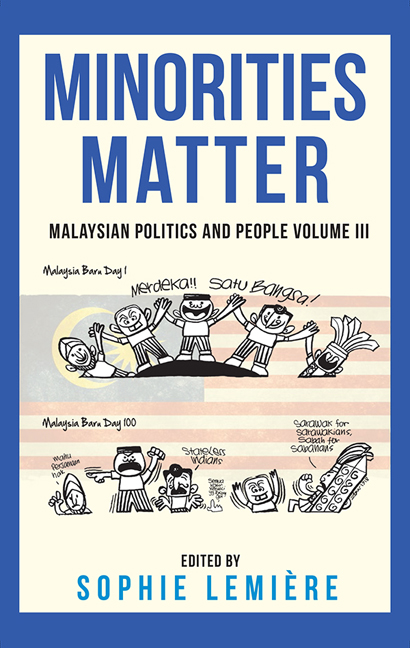Book contents
- Frontmatter
- Contents
- Acknowledgements
- Foreword
- Introduction
- Part I Engaging Politics: The Role of Minorities in GE14 and Beyond
- 1 Local Elections, Decentralisation, and Institutional Reform
- 2 ‘Where's Our #30peratus’: A Feminist Critical Discourse Analysis of Twitter Debates on Women's Political Representation
- 3 Romantic Whispers: When Relationships Mobilise Political Agency in the Sabah Elections
- 4 The Orang Asli in GE14: Towards Meaningful Political Engagement?
- 5 The 1963 Malaysia Agreement (MA63): Sabah and Sarawak and the Politics of Historical Grievances
- Part II Building Democracy: Malaysia Baru and the (Im-)possible Reform
- List of Contributors
5 - The 1963 Malaysia Agreement (MA63): Sabah and Sarawak and the Politics of Historical Grievances
from Part I - Engaging Politics: The Role of Minorities in GE14 and Beyond
Published online by Cambridge University Press: 25 January 2020
- Frontmatter
- Contents
- Acknowledgements
- Foreword
- Introduction
- Part I Engaging Politics: The Role of Minorities in GE14 and Beyond
- 1 Local Elections, Decentralisation, and Institutional Reform
- 2 ‘Where's Our #30peratus’: A Feminist Critical Discourse Analysis of Twitter Debates on Women's Political Representation
- 3 Romantic Whispers: When Relationships Mobilise Political Agency in the Sabah Elections
- 4 The Orang Asli in GE14: Towards Meaningful Political Engagement?
- 5 The 1963 Malaysia Agreement (MA63): Sabah and Sarawak and the Politics of Historical Grievances
- Part II Building Democracy: Malaysia Baru and the (Im-)possible Reform
- List of Contributors
Summary
While Malaysia underwent a peaceful regime change in the 14th general elections (GE14), one issue not discussed widely enough is the different political dynamics operating in the East Malaysian states of Sabah and Sarawak. Unlike other states, Sabah and Sarawak are physically located in Borneo, far away from Putrajaya. These two states have a very different history, demography and social history from the eleven states in the Malay Peninsula, or Malaya. In the past decade, politics in these two states have been increasingly dictated by state nationalism, which locals refer to as ‘MA63’. This refers to the Malaysia Agreement, the legal instrument signed in 1963 which led to the formation of the Federation of Malaysia. After more than half a century, many in Sabah and Sarawak think that they did not get anything out of the federation despite many promises made prior to the signing of MA63. Today, all the political parties in Sabah and Sarawak are clamouring for ‘rights’ lost in the past fifty years and are openly calling for a review of federal–state relations.
This chapter will detail the historical grievances among the peoples of Sabah and Sarawak and argue that if Putrajaya does not take heed of the unhappiness, over the long term there is a real risk of secession or a breakdown in federal–state relations.
Introduction
On 9 May 2018, Malaysia underwent a peaceful regime change after more than six decades of rule by the Barisan Nasional (BN) and UMNO, the linchpin of the BN. While many articles have concentrated on why UMNO lost control, little attention has been paid to the political dynamics in Sabah and Sarawak, the two Malaysian states located in Borneo. It is my argument that not only are the political dynamics different in the Borneo states, historical grievances over the 1963 Malaysia Agreement (MA63), the agreement that led to the formation of the Malaysian Federation, are the main political force shaping Sabah and Sarawak politics.
MA63 and GE14
In Sabah, the GE14 contest was all about Parti Warisan Sabah (PWS), a new political party established by Shafie Apdal and Darell Leiking, and Sabah UMNO. In 2016 Shafie Apdal, then UMNO's vice-president, was sacked from the Federal Cabinet when he questioned Prime Minister Najib Razak over the 1MDB scandal.
- Type
- Chapter
- Information
- Minorities MatterMalaysian Politics and People Volume III, pp. 74 - 90Publisher: ISEAS–Yusof Ishak InstitutePrint publication year: 2019

